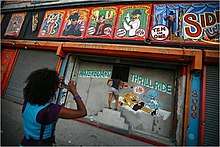Coney Island waterboarding thrill ride
The Coney Island waterboarding thrill ride was a work in Coney Island, Brooklyn, New York City conceived by conceptual artist Steve Powers in mid-2008.[1][2][3]

As originally conceived, Powers saw the public watching volunteers undergoing actual waterboarding.[1] The Washington Post reported that on August 17, 2008 Powers brought in Mike Ritz, a former US official experienced in administering waterboarding, for a one time demonstration of waterboarding on volunteers.[2] This demonstration was not open to the general public, but rather for an invited audience. Powers himself was one of the volunteers.
As built, the thrill ride was a diorama, where viewers would mount stairs to a window where they would see a tableau of two models, one a captive, one a masked interrogator. The captive was wearing an orange uniform "non-compliant" captives wear in the United States' Guantanamo Bay detention camps, in Cuba, and was spread-eagled on a tilted table.
When the piece was installed, in July 2008, viewers inserted a dollar the interrogator figure would pour water onto a rag over the captive figures' nose and throat, upon which the captive figure would start convulsing.
The piece was installed in a row of ordinary Coney Island freak shows and concessions. When installed the thrill ride triggered coverage and commentary around the world.[4][5]
The installation's last viewing was on September 14, 2008.[6]
Powers told The New York Times his purpose in preparing the display was educational:
*"What's more obscene, the official position that waterboarding is not torture, or our official position that it's a thrill ride?"[7]
- "Robot waterboarding became a way of exploring the issue without doing any harm. It's putting a unique experience on the table. And it doesn't take a great leap of the imagination to look in there and say: 'That's really what's going on? That's crazy.'"[7]
References
- "Steve Powers Wants to See You Get Waterboarded". New York Magazine. June 27, 2008. Archived from the original on April 19, 2009.
- Robin Shulman (August 17, 2008). "In N.Y., Waterboarding as Dark Art". The Washington Post. Archived from the original on April 2, 2016. Retrieved November 11, 2011.
He first wanted real people to undergo waterboarding for the public, but he realized that might be tricky and limited it to the one-time private experiment. For the public display, with robotic stand-ins, Powers concerned himself with details such as finding music mentioned on blogs as having been played to prisoners at Abu Ghraib and Guantanamo.
- Julie Bloom (July 30, 2008). "Waterboarding as Art". The New York Times. Archived from the original on November 11, 2011. Retrieved November 11, 2011.
The journalist Christopher Hitchens underwent waterboarding for a recent Vanity Fair article. Now an artist is using that interrogation technique — which makes people feel as if they were drowning — to raise awareness of the issue of torture.
CS1 maint: BOT: original-url status unknown (link) - Will Safer (August 7, 2008). "Coney Island's Robotic 'Waterboard Thrill Ride' Evokes Guantanamo". Huffington Post. Archived from the original on April 17, 2009.
- Ritsuke Ando (August 7, 2008). "Waterboarding an attraction at amusement park". Reuters. Archived from the original on April 17, 2009.
- "The Waterboard Thrill Ride". Brooklynbased. September 2008. Archived from the original on April 17, 2009.
Brooklyn artist Steve Powers’ installation has been up since July beside less menacing Coney Island sideshows: Pay $1, and see an animatronic torturer in action. It should be on view 2-6 on Friday and 2-8, Saturday, Sept. 14, when it closes.
- Kaminer, Ariel (August 7, 2008). "Coney Island Sideshow Has Guantánamo Theme". The New York Times. Retrieved April 20, 2009.